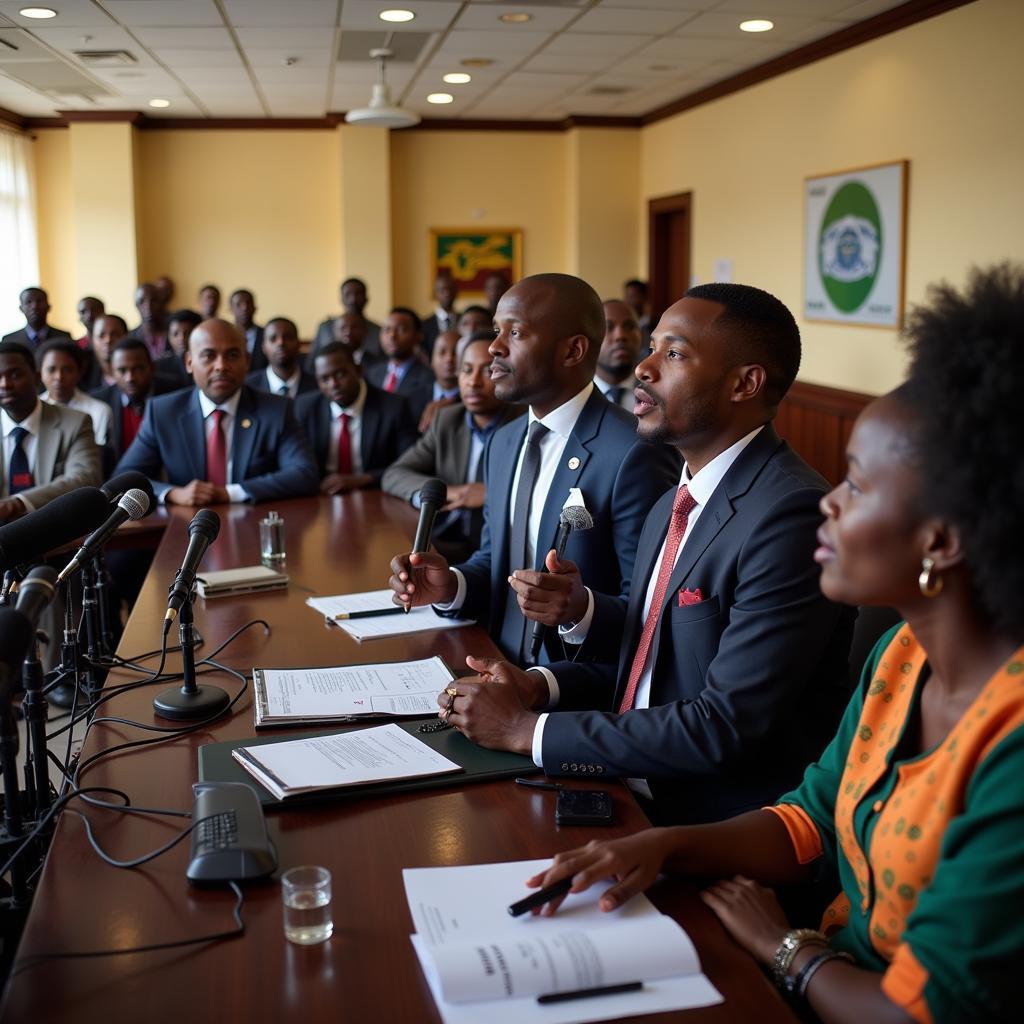Understanding the African Charter and its Impact on Journalists
The African Charter on Human and Peoples’ Rights plays a crucial role in defining the rights and freedoms of journalists across the African continent. This charter, adopted in 1981, addresses various fundamental rights, including freedom of expression, which is vital for the work of journalists. It sets a framework for promoting and protecting these rights, but its implementation faces various challenges across different African nations.
What is the African Charter and How Does it Relate to Journalists?
The African Charter, also known as the Banjul Charter, is a human rights treaty that establishes a system for protecting and promoting human and peoples’ rights in Africa. For journalists, the charter’s significance lies primarily in its articles related to freedom of expression, information, and association. These provisions, while essential for a free press, are often interpreted and implemented differently across diverse legal and political landscapes within Africa.
The right to freedom of expression, as outlined in the charter, empowers journalists to report on matters of public interest without undue interference. However, this right is not absolute and can be limited in certain circumstances, such as to protect national security or public order. The balance between these limitations and the core principle of free expression is a constant point of contention.
One key aspect of the African Charter is its recognition of the right to access information. This right is crucial for journalists to fulfill their role as watchdogs and inform the public. Access to government documents and information held by public bodies is essential for holding power accountable. However, many African governments still face challenges in implementing transparency laws and ensuring genuine access to information for journalists.
Challenges and Opportunities for African Charter Journalists
While the African Charter provides a legal framework, the reality for journalists on the ground is complex. Several challenges hinder the full realization of press freedom in Africa. These include restrictive media laws, censorship, harassment, and even violence against journalists. Furthermore, the lack of independent judicial systems and effective mechanisms for redress further complicates the situation.
Despite these challenges, there are also significant opportunities emerging. The rise of independent media outlets, both online and offline, offers new avenues for disseminating information and holding power to account. Civil society organizations are also playing a crucial role in advocating for press freedom and supporting journalists facing persecution.
 African Journalists Collaborating Online for Press Freedom
African Journalists Collaborating Online for Press Freedom
Dr. Amina Ousmane, a prominent media law expert based in Senegal, emphasizes the importance of regional collaboration: “Strengthening cross-border networks for journalists is essential to share best practices, support each other, and amplify their voices on a continental level.”
How can the African Charter be better enforced?
One crucial aspect is strengthening the mechanisms for monitoring and enforcing the charter’s provisions. The African Commission on Human and Peoples’ Rights has a vital role to play in this regard, but it requires greater resources and political backing to effectively address violations of press freedom.
Another key area for improvement is the domestic implementation of the charter. African governments need to incorporate the charter’s principles into national legislation and ensure that their judicial systems are equipped to protect the rights of journalists.
 African Journalists Holding a Press Conference
African Journalists Holding a Press Conference
Conclusion
The African Charter on Human and Peoples’ Rights, particularly its articles relating to freedom of expression, provides a crucial framework for protecting African Charter Journalists. However, translating these principles into tangible improvements for journalists on the ground requires continuous effort, collaboration, and a strong commitment from both governments and civil society. Only then can the promise of a truly free press in Africa be realized.
FAQs
- What are the key articles in the African Charter related to press freedom? (Articles 9 on freedom of expression and 13 on the right to participate in government).
- How does the African Charter address the issue of access to information? (Article 9 acknowledges the right to receive information.)
- What are some of the challenges facing journalists in Africa? (Censorship, harassment, restrictive laws, and lack of safety.)
- What role does the African Commission on Human and Peoples’ Rights play in protecting press freedom? (It monitors state compliance with the charter and investigates human rights violations.)
- How can the international community support African journalists? (By providing training, funding, and advocacy for press freedom).
- What is the connection between the African Charter and freedom of expression? (The African Charter guarantees freedom of expression as a fundamental human right, which is crucial for journalists’ work.)
- How does the African Charter’s protection of journalists compare to other international human rights instruments? (While the African Charter provides a strong foundation, its implementation and enforcement mechanisms often face challenges compared to some global instruments.)
You might also want to explore the african charter on human and peoples rights freedom of expression.
Need further assistance? Please contact us at Phone Number: +255768904061, Email: [email protected] Or visit our office: Mbarali DC Mawindi, Kangaga, Tanzania. Our customer service team is available 24/7.
